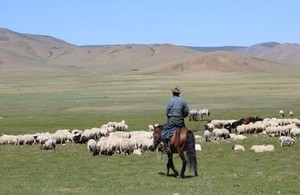SIBELIUs: Improved resilience for Mongolian herding communities
Improved severe weather resilience for Mongolian herding communities using satellite Earth observation derived environmental services

Project lead
eOsphere Limited
Target Country
Mongolia
Project consortium
Deimos Space UK, University of Leicester, Micro-insurance Research Centre UK (MIRCUK)
International Partners
National Agency for Meteorology and Environmental Monitoring of Mongolia (NAMEM), Agricultural Reinsurance (AgRe), Ministry for Agriculture and Light Industry, Administration for Inter-Aimag Otor Pastureland Use and Co-ordination, Center for Nomadic Pastoralism Studies (CNPS)
Project Summary
Mongolia is a large, but extremely rural country with approximately 30% of its population dependant on livestock herding. These populations are exposed to extreme weather events, known as dzuds, which are increasingly exacerbated by climate change and are highly damaging to Mongolia’s economy and devastating for the poorest herders. A typical dzud can impact tens of thousands of herders many of whom will lose all their livestock leaving them in extreme poverty, with associated impacts for the wider economy.
SIBELIUs will provide greater dzud-resilience for herders by providing Mongolia’s National Agency for Meteorology and Environmental Monitoring (NAMEM) with improved capacity for distributing new and upgraded environmental products to key stakeholders supporting herding communities. An aspect of the project is to channel the benefits of improved products through three existing networks:
- The Mongolian Index Based Linked Livestock Insurance scheme (set up by the World Bank in 2006).
- Otor Grazing Reserves which provide emergency grazing for use in dzuds.
- NAMEM’s existing network of regional centres.
As a vital component of the project, SIBELIUs will work with herders at selected case study sites to analyse their information requirements, to better understand barriers to uptake of previous insurance products, and to ensure their voices and priorities are heard in the development and distribution of new satellite-based environmental products.
Objectives
- Improve the dzud-resilience of the Mongolian herding population by better integrating new satellite derived environmental information into existing government and insurance networks.
- Assist in building capacity at Mongolia’s National Agency for Meteorology and Environmental Monitoring (NAMEM) for distributing new and upgraded environmental products to key stakeholders supporting herding communities.
- Work with local stakeholders, including herding households at case study sites, to co-produce and design these products, in order to take account of their needs and requirements.
- Provide access to new sources of satellite data to facilitate new improved high resolution regionally sensitive dzud prediction products & grazing capacity information for distribution to end users: regional meteorological centres, the insurance sector and the Otor Reserve Administration.
- Aim to decrease the number of directly affected persons and direct economic losses attributed to dzud related disasters.
- To further develop and strengthen links between UK and Mongolian institutions for better understanding and tackling climate-related extreme events.